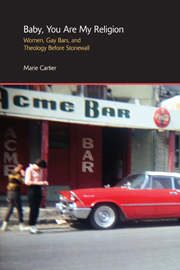Book contents
- Frontmatter
- Dedication
- Contents
- Acknowledgments
- Preface: Myrna's story
- 1 It was the only place
- Part I Interviews
- 2 The 1940s: “Thank God the Japanese surrendered”.
- 3 The 1950s: “I should have made a list of my girlfriends!”
- 4 The 1960s: “It was … Hollywood! We did a girlfriend … daisy chain!”
- 5 The 1970s: “We were … women in overalls dancing with women in overalls. they kicked us out.”
- 6 The 1980s: “I really did think I was Jess from Stone Butch Blues reincarnated.”
- Part II Theological history and contexts
- Part III The nature of “theology”
- Appendix A Demographics
- Appendix B Sources
- Bibliography
- Index
2 - The 1940s: “Thank God the Japanese surrendered”.
from Part I - Interviews
- Frontmatter
- Dedication
- Contents
- Acknowledgments
- Preface: Myrna's story
- 1 It was the only place
- Part I Interviews
- 2 The 1940s: “Thank God the Japanese surrendered”.
- 3 The 1950s: “I should have made a list of my girlfriends!”
- 4 The 1960s: “It was … Hollywood! We did a girlfriend … daisy chain!”
- 5 The 1970s: “We were … women in overalls dancing with women in overalls. they kicked us out.”
- 6 The 1980s: “I really did think I was Jess from Stone Butch Blues reincarnated.”
- Part II Theological history and contexts
- Part III The nature of “theology”
- Appendix A Demographics
- Appendix B Sources
- Bibliography
- Index
Summary
The most successful advertising war recruitment campaign in American history utilized Rosie the Riveter, a fictional character immortalized by posters supporting the war effort. [It] recruited more than two million women into the workforce [in] war production plants and necessary civilian services … millions of American women had never worked outside their homes. … the ads led to tremendous change in relations between women and the workplace … employment outside of home became socially acceptable.
OVERVIEW
Tank God the Japanese surrendered …
Ginny was attracted to a female summer camp counselor and felt confused and frightened by her feelings, not knowing what they meant. On the night the Japanese surrendered, thus ending World War II in 1945, the only thing they had to celebrate with at the summer camp was coffee. Ginny drank so much coffee, and got so jittery, that the counselor/source of her nervousness wrapped a blanket around her. In her jittery state Ginny finally asked the question that was on her mind: “Do you have a penis under there? Because why else would I feel the way I do?” Her friend said, “If you really feel this way come to my house and we'll talk.” So after camp Ginny did, and the woman, Corinne, read to her for twenty minutes from the groundbreaking novel, Well of Loneliness by Radclyffe Hall, and “we were together for 47 years.
- Type
- Chapter
- Information
- Baby, You Are My ReligionWomen, Gay Bars, and Theology Before Stonewall, pp. 33 - 50Publisher: Acumen PublishingPrint publication year: 2013



